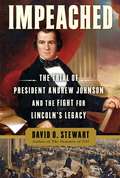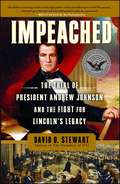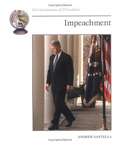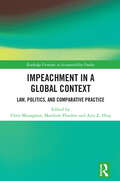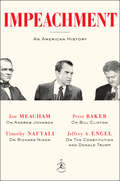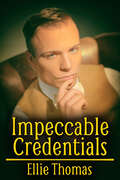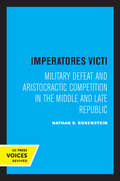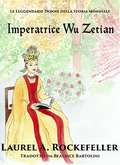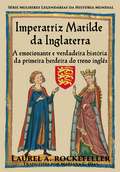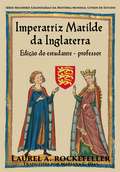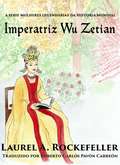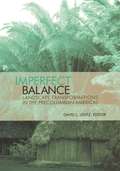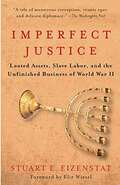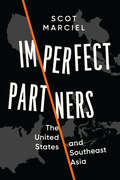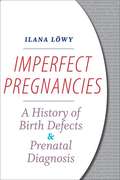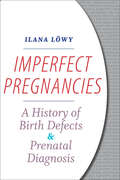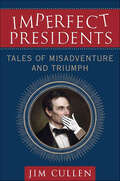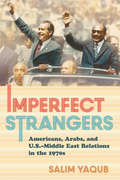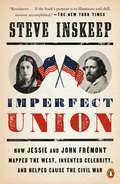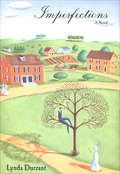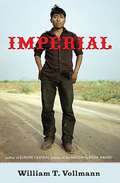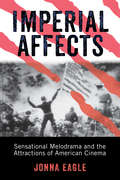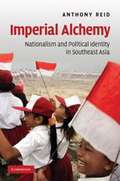- Table View
- List View
Impeached: The Trial of President Andrew Johnson and the Fight for Lincoln's Legacy
by David O. StewartAfter the Civil War, the nation came close to tearing itself apart, again, during the impeachment struggle between Congress and President Andrew Johnson in the spring of 1868.
Impeached: The Trial of President Andrew Johnson and the Fight for Lincoln's Legacy
by David O. StewartIn 1868 Congress impeached President Andrew Johnson of Tennessee, the man who had succeeded the murdered Lincoln, bringing the nation to the brink of a second civil war. Enraged to see the freed slaves abandoned to brutal violence at the hands of their former owners, distraught that former rebels threatened to regain control of Southern state governments, and disgusted by Johnson's brawling political style, congressional Republicans seized on a legal technicality as the basis for impeachment -- whether Johnson had the legal right to fire his own secretary of war, Edwin Stanton.
Impeachment (Cornerstones of Freedom)
by Andrew SantellaSurveys the history of impeachment in the United States, discussing the basic rules and procedures and notable officials who have been impeached.
Impeachment in a Global Context: Law, Politics, and Comparative Practice (Routledge Frontiers in Accountability Studies)
by Aziz Z. Huq Chris Monaghan Matthew FlindersThis volume considers the use of impeachment within a global context. The book brings together leading scholars and experts to give an insight into significant periods in the development of impeachment and its modern comparative use. Divided into five parts, the opening chapter introduces the topic and underlines its significance in terms of understanding the relationship and inter-dependence among politics, governance and the law. It also offers a novel conceptual framework that facilitates the global mapping of impeachment processes. Part I presents a thematic approach that explores the topic of impeachment through the lenses of democracy, human rights and the rule of law. With these themes in mind, Part II focuses on those parts of the world where impeachment is generally recognised as a core constitutional process including the United States, South Korea, Brazil and other countries in South America. Part III continues with the process of constitutional mapping by moving to a focus on those countries where impeachment is arguably an important but largely secondary or peripheral process. This includes chapters on Denmark, Iceland, Sri Lanka and the Philippines and flows through into Part IV’s focus on areas of the world where impeachment matters and may even be increasing in terms of visibility but, for a number of reasons, arguably exists within a satellite status in terms of constitutional processes and safeguards. The fifth and final section steps back in an attempt to assess impeachment processes from a broad comparative perspective. The collection presents the definitive text on impeachment for students and scholars with an interest in comparative public law, politics and constitutional studies.
Impeachment: An American History
by Jon Meacham Peter Baker Jeffrey A. Engel Timothy NaftaliFour experts on the American presidency examine the three times impeachment has been invoked—against Andrew Johnson, Richard Nixon, and Bill Clinton—and explain what it means today.Impeachment is a double-edged sword. Though it was designed to check tyrants, Thomas Jefferson also called impeachment “the most formidable weapon for the purpose of a dominant faction that was ever contrived.” On the one hand, it nullifies the will of voters, the basic foundation of all representative democracies. On the other, its absence from the Constitution would leave the country vulnerable to despotic leadership. It is rarely used, and with good reason. Only three times has a president’s conduct led to such political disarray as to warrant his potential removal from office, transforming a political crisis into a constitutional one. None has yet succeeded. Andrew Johnson was impeached in 1868 for failing to kowtow to congressional leaders—and, in a large sense, for failing to be Abraham Lincoln—yet survived his Senate trial. Richard Nixon resigned in August 1974 after the House Judiciary Committee approved three articles of impeachment against him for lying, obstructing justice, and employing his executive power for personal and political gain. Bill Clinton had an affair with a White House intern, but in 1999 he faced trial in the Senate less for that prurient act than for lying under oath about it. In the first book to consider these three presidents alone—and the one thing they have in common—Jeffrey A. Engel, Jon Meacham, Timothy Naftali, and Peter Baker explain that the basis and process of impeachment is more political than legal. The Constitution states that the president “shall be removed from Office on Impeachment for, and Conviction of, Treason, Bribery, or other high Crimes and Misdemeanors,” leaving room for historical precedent and the temperament of the time to weigh heavily on each case. This book reveals the complicated motives behind each impeachment—never entirely limited to the question of a president’s guilt—and the risks to all sides. Each case depended on factors beyond the president’s behavior: his relationship with Congress, the polarization of the moment, and the power and resilience of the office itself. This is a realist view of impeachment that looks to history for clues about its potential use in the future.
Impeccable Credentials
by Ellie ThomasSequel to Petticoats and PantaloonsOutwardly, twenty-one-year-old Julian Buchanan is the epitome of wealth, breeding and good looks. He’s a pink of the ton in Regency London, and his position in society is assured. But beneath his impeccable surface, Julian is riddled with doubt.Matters come to a head in the autumn of 1812 when his autocratic father, Sir Roger Buchanan, orders Julian to court an heiress and propose marriage. Finally, Julian must acknowledge that he has no interest in women. At the same time, he becomes involved with Rafe Ingles, a radical intellectual whose beliefs concur with Julian’s inward convictions.With pressure building and so much at stake, can Julian find the courage to break the habit of a lifetime and choose love and freedom over duty?
Imperatores Victi: Military Defeat and Aristocractic Competition in the Middle and Late Republic
by Nathan S. RosensteinGiven the intense competition among aristocrats seeking public office in the middle and late Roman Republic, one would expect that their persistent struggles for honor, glory, and power could have seriously undermined the state or damaged the cohesiveness of the ruling class. Rome in fact depended on aristocratic competition, since no professional bureaucracy directed public affairs and no salary was attached to any public office. But as Rosenstein adeptly shows, competition appears to have been surprisingly limited, in ways that curtailed the possible destructive effects of all-out contests between individuals.Imperatores Victi examines one particularly striking case of such checks on competition. Military success at all times represented an abundant source of prestige and political strength at Rome. Generals who led armies to victory enjoyed a better-than-average chance of securing higher office upon their return from the field. Yet this study demonstrates that defeated generals were not barred from public office and in fact went on to win the Republic's most highly coveted and hotly contested offices in numbers virtually identical with those of their undefeated peers. Rosenstein explores how this unexpected limit to competition functions, reviewing beliefs about the religious origins of defeat, assumptions about common soldiers' duties in battle, and definitions of honorable behavior of an aristocrat during a crisis. These perspectives were instrumental in shifting the onus of failure away from a general's person and in offering positive strategies a general might use to win glory and respect even in defeat and to silence potential critics among a failed general's peers. Such limits to competition had an impact on the larger problems of stability and coherence in the Republic and its political elite; these larger problems are discussed in the concluding chapter. This title is part of UC Press's Voices Revived program, which commemorates University of California Press’s mission to seek out and cultivate the brightest minds and give them voice, reach, and impact. Drawing on a backlist dating to 1893, Voices Revived makes high-quality, peer-reviewed scholarship accessible once again using print-on-demand technology. This title was originally published in 1990.
Imperatrice Wu Zetian
by Laurel A. RockefellerLa donna più odiata nella storia della Cina! Viaggia indietro nel tempo di più di mille anni e incontra la prima e unica imperatrice donna della Cina. Nata come Wu Zhao e nominata col titolo reale di "Zetian" poche settimane prima della sua morte nel 705 DC, era la figlia non voluta del Cancelliere Wu Shihuo -- troppo intelligente, troppo acculturata, e troppo concentrata politicamente per farne una buona moglie secondo le interpretazioni dell'epoca dei Dialoghi di Confucio. C'è da meravigliarsi che ancora oggi rimanga la donna più odiata di tutta la storia cinese e una delle sue più controverse? Esplora la vita dell'Imperatrice Wu e scopri perchè il mondo è un posto completamente diverso perché ha osato ciò che nessuna donna in Cina prima o da allora ha mai sognato.
Imperatriz Matilde da Inglaterra
by Laurel A. RockefellerA leoa destemida da Inglaterra! Nascida em 1102 para o rei Henry da Inglaterra e para a rainha Matilde da Escócia, a ancestralidade normanda, saxã e escocesa de Matilde estava destinada a unificar a Inglaterra ainda dividida pela conquista do avô em 1066. Quando o Desastre do Barco Branco, em 1120, fez dela a única filha sobrevivente de seus pais, Matilde de repente se tornou herdeira do trono inglês em uma época em que o velho Witan saxão, e não o testamento do rei, ainda decidia a sucessão. Descubra a verdadeira história da primeira mulher a reivindicar o trono inglês por direito próprio e inspire-se! Inclui a árvore genealógica da família de Matilde, uma linha do tempo detalhada e uma lista de sugestões de leituras para que você possa continuar aprendendo.
Imperatriz Matilde da Inglaterra: Edição do estudante – professor
by Laurel A. RockefellerA leoa destemida da Inglaterra! Nascida em 1102 para o rei Henry da Inglaterra e para a rainha Matilde da Escócia, a ancestralidade normanda, saxã e escocesa de Matilde estava destinada a unificar a Inglaterra ainda dividida pela conquista do avô em 1066. Quando o Desastre do Barco Branco, em 1120, fez dela a única filha sobrevivente de seus pais, Matilde de repente se tornou herdeira do trono inglês em uma época em que o velho Witan saxão, e não o testamento do rei, ainda decidia a sucessão. Descubra a verdadeira história da primeira mulher a reivindicar o trono inglês por direito próprio e inspire-se! Esta edição do estudante – professor inclui perguntas para estudo desafiadoras depois de cada capítulo, além de uma linha do tempo detalhada e uma extensa lista com leituras sugeridas.
Imperatriz Wǔ Zétiān
by Roberto Carlos Pavón Carreón Laurel A. RockefellerA mulher mais odiada da história chinesa! Viaje no tempo mais de mil anos e conheça o primeiro e único imperador do sexo feminino da China. Nascido Wǔ Zhào e dado o título reinado "Zétiān" apenas algumas semanas antes de sua morte em 705 dC, ela era a filha indesejada do chanceler Wǔ Shihuo - muito brilhante, muito instruída e muito politicamente focada para fazer uma boa esposa de acordo com interpretações contemporâneas dos Analectos de Confúcio. Ela pode ser de admirar que até hoje ela continua a ser a mulher mais odiada em toda a história chinesa e um dos seus mais controversos? Explore a vida da imperatriz Wǔ e descubra por que o mundo é um lugar muito diferente, porque ela ousou o que nenhuma mulher na China antes ou desde sempre sonhou.
Imperfect Balance: Landscape Transformations in the Pre-Columbian Americas
by David L. LentzWe often envision the New World before the arrival of the Europeans as a land of pristine natural beauty and undisturbed environments. However, David Lentz offers an alternative view by detailing the impact of native cultures on these ecosystems prior to their contact with Europeans. Drawing on a wide range of experts from the fields of paleoclimatology, historical ecology, paleontology, botany, geology, conservation science, and resource management, this book unlocks the secret of how the Western Hemisphere's indigenous inhabitants influenced and transformed their natural environment. A rare combination of collaborators uncovers the changes that took place in North America, Mexico, Central America, the Andes, and Amazonia. Each section of the book has been comprehensively arranged so that a botanical description of the natural vegetation of the region is coupled with a set of case studies outlining local human influences. From modifications of vegetation, to changes in soil, wildlife, microclimate, hydrology, and the land surface itself, this collection addresses one of the great issues of our time: the human modification of the earth.
Imperfect Balance: Landscape Transformations in the Pre-Columbian Americas (Historical Ecology Series)
by Ed. David L. LentzWe often envision the New World before the arrival of the Europeans as a land of pristine natural beauty and undisturbed environments. However, David Lentz offers an alternative view by detailing the impact of native cultures on these ecosystems prior to their contact with Europeans. Drawing on a wide range of experts from the fields of paleoclimatology, historical ecology, paleontology, botany, geology, conservation science, and resource management, this book unlocks the secret of how the Western Hemisphere's indigenous inhabitants influenced and transformed their natural environment.A rare combination of collaborators uncovers the changes that took place in North America, Mexico, Central America, the Andes, and Amazonia. Each section of the book has been comprehensively arranged so that a botanical description of the natural vegetation of the region is coupled with a set of case studies outlining local human influences. From modifications of vegetation, to changes in soil, wildlife, microclimate, hydrology, and the land surface itself, this collection addresses one of the great issues of our time: the human modification of the earth.
Imperfect Justice: Looted Assets, Slave Labor, and the Unfinished Business of World War II
by Elie Wiesel Stuart EizenstatImperfect Justice is Stuart Eizenstat's personal account of how the Holocaust became a political and diplomatic battleground fifty years after the war's end, as the issues of dormant bank accounts, slave labor, confiscated property, looted art, and unpaid insurance policies convulsed Europe and America. His story is not one of easy successes or an idyllic view of justice. Rather, it is a revealing chronicle of high-stakes negotiations involving heads of European governments, played out on an international stage in an emotionally charged atmosphere, with a subtext of crimes against humanity and billions of dollars on the table. <p><p>Eizenstat recounts the often heated negotiations with the Swiss, the Germans, the French, the Austrians, and various Jewish organizations, showing how moral and legal issues shunted aside for so long, exposed wounds that had never healed and conflicts that had never been properly resolved. Each country responded in its own way: Switzerland fought the disclosures about its past and deeply resented the outside pressure it faced; Germany accepted that it was once again called upon to account for its wartime sins, this time for those committed by private industry; Austria was torn, seeing itself as both victim and collaborator with Hitler; and France courageously accepted national responsibility for the Vichy regime. And on the other side of the table were a remarkable cast of characters: class-action lawyers, some of whom were altruistic while others were as interested in their own press clippings as in serving the needs of the survivors they represented; Jewish organizations that were at each other's throats over who best represented the victims in their quest for justice; politicians with their own agendas and ambitions, including New York's colorful Senator Alfonse D'Amato, who turned the issue into his own personal crusade; and the President of the United States, Bill Clinton.
Imperfect Partners: The United States and Southeast Asia
by Scot MarcielImperfect Partners is a unique hybrid – part memoir, part foreign policy study of U.S. relations with Southeast Asia, a critically important region that has become the central arena in the global U.S.-China competition. From the People Power revolt in the Philippines to the opening of diplomatic relations with Vietnam, from building a partnership with newly democratic Indonesia to responding to genocide in Myanmar and coups in Thailand, Scot Marciel was present and involved. His direct involvement and deep knowledge of the region, along with his extensive policymaking work in Washington, allows him to bring to life the complexities and realities of key events and U.S. responses, along with rare insights into U.S. foreign policy decisionmaking and the work of American diplomats in the field.
Imperfect Pregnancies: A History of Birth Defects and Prenatal Diagnosis
by Ilana Löwy<p>In the 1960s, thanks to the development of prenatal diagnosis, medicine found a new object of study: the living fetus. At first, prenatal testing was proposed only to women at a high risk of giving birth to an impaired child. But in the following decades, such testing has become routine. <p>In Imperfect Pregnancies, Ilana Löwy argues that the generalization of prenatal diagnosis has radically changed the experience of pregnancy for tens of millions of women worldwide. Although most women are reassured that their future child is developing well, others face a stressful period of waiting for results, uncertain prognosis, and difficult decisions. Löwy follows the rise of biomedical technologies that made prenatal diagnosis possible and investigates the institutional, sociocultural, economic, legal, and political consequences of their widespread diffusion. <p>Because prenatal diagnosis is linked to the contentious issue of selective termination of pregnancy for a fetal anomaly, debates on this topic have largely centered on the rejection of human imperfection and the notion that we are now perched on a slippery slope that will lead to new eugenics. Imperfect Pregnancies tells a more complicated story, emphasizing that there is no single standardized way to scrutinize the fetus, but there are a great number of historically conditioned and situated approaches. This book will interest students, scholars, health professionals, administrators, and activists interested in issues surrounding new medical technologies, screening, risk management, pregnancy, disability, and the history and social politics of women’s bodies.</p>
Imperfect Pregnancies: A History of Birth Defects and Prenatal Diagnosis
by Ilana LöwyHow has prenatal testing, once offered only for high-risk pregnancies, become standard medical care for pregnant women today?In the 1960s, thanks to the development of prenatal diagnosis, medicine found a new object of study: the living fetus. At first, prenatal testing was proposed only to women at a high risk of giving birth to an impaired child. But in the following decades, such testing has become routine. In Imperfect Pregnancies, Ilana Löwy argues that the generalization of prenatal diagnosis has radically changed the experience of pregnancy for tens of millions of women worldwide. Although most women are reassured that their future child is developing well, others face a stressful period of waiting for results, uncertain prognosis, and difficult decisions. Löwy follows the rise of biomedical technologies that made prenatal diagnosis possible and investigates the institutional, sociocultural, economic, legal, and political consequences of their widespread diffusion. Because prenatal diagnosis is linked to the contentious issue of selective termination of pregnancy for a fetal anomaly, debates on this topic have largely centered on the rejection of human imperfection and the notion that we are now perched on a slippery slope that will lead to new eugenics. Imperfect Pregnancies tells a more complicated story, emphasizing that there is no single standardized way to scrutinize the fetus, but there are a great number of historically conditioned and situated approaches. This book will interest students, scholars, health professionals, administrators, and activists interested in issues surrounding new medical technologies, screening, risk management, pregnancy, disability, and the history and social politics of women’s bodies.
Imperfect Presidents: Tales of Misadventure and Triumph
by Jim CullenWhen people make bad decisions, odd remarks, and just plain silly mistakes, the results are sure to haunt them. But when these things happen to the president of the United States, they can change the course of history. In this clever portrait of the American presidency, Jim Cullen takes ten presidents down from their pedestals by examining key missteps in their careers--and how they transcended them. Examples include Abraham Lincoln smearing a preacher and rediscovering his religious vision in emancipating slaves; Lyndon Johnson's electoral fraud in his 1948 Senate race and his role in the signing of the Voting Rights Act; and Ronald Reagan's subversion of the Constitution in the Iran-Contra affair and affirmation of world peace in helping bring about the end of the Cold War. Targeting Republicans and Democrats alike, Cullen's insights are surprisingly timely and hugely entertaining.
Imperfect Strangers: Americans, Arabs, and U.S.–Middle East Relations in the 1970s
by Salim YaqubIn Imperfect Strangers, Salim Yaqub argues that the 1970s were a pivotal decade for U.S.-Arab relations, whether at the upper levels of diplomacy, in street-level interactions, or in the realm of the imagination. In those years, Americans and Arabs came to know each other as never before. With Western Europe's imperial legacy fading in the Middle East, American commerce and investment spread throughout the Arab world. The United States strengthened its strategic ties to some Arab states, even as it drew closer to Israel. Maneuvering Moscow to the sidelines, Washington placed itself at the center of Arab-Israeli diplomacy. Meanwhile, the rise of international terrorism, the Arab oil embargo and related increases in the price of oil, and expanding immigration from the Middle East forced Americans to pay closer attention to the Arab world.Yaqub combines insights from diplomatic, political, cultural, and immigration history to chronicle the activities of a wide array of American and Arab actors—political leaders, diplomats, warriors, activists, scholars, businesspeople, novelists, and others. He shows that growing interdependence raised hopes for a broad political accommodation between the two societies. Yet a series of disruptions in the second half of the decade thwarted such prospects. Arabs recoiled from a U.S.-brokered peace process that fortified Israel’s occupation of Arab land. Americans grew increasingly resentful of Arab oil pressures, attitudes dovetailing with broader anti-Muslim sentiments aroused by the Iranian hostage crisis. At the same time, elements of the U.S. intelligentsia became more respectful of Arab perspectives as a newly assertive Arab American community emerged into political life. These patterns left a contradictory legacy of estrangement and accommodation that continued in later decades and remains with us today.
Imperfect Union: How Jessie and John Frémont Mapped the West, Invented Celebrity, and Helped Cause the Civil War
by Steve InskeepSteve Inskeep tells the riveting story of John and Jessie Frémont, the husband and wife team who in the 1800s were instrumental in the westward expansion of the United States, and thus became America's first great political couple John C. Frémont, one of the United States&’s leading explorers of the nineteenth century, was relatively unknown in 1842, when he commanded the first of his expeditions to the uncharted West. But in only a few years, he was one of the most acclaimed people of the age – known as a wilderness explorer, bestselling writer, gallant army officer, and latter-day conquistador, who in 1846 began the United States&’s takeover of California from Mexico. He was not even 40 years old when Americans began naming mountains and towns after him. He had perfect timing, exploring the West just as it captured the nation&’s attention. But the most important factor in his fame may have been the person who made it all possible: his wife, Jessie Benton Frémont. Jessie, the daughter of a United States senator who was deeply involved in the West, provided her husband with entrée to the highest levels of government and media, and his career reached new heights only a few months after their elopement. During a time when women were allowed to make few choices for themselves, Jessie – who herself aspired to roles in exploration and politics – threw her skill and passion into promoting her husband. She worked to carefully edit and publicize his accounts of his travels, attracted talented young men to his circle, and lashed out at his enemies. She became her husband&’s political adviser, as well as a power player in her own right. In 1856, the famous couple strategized as John became the first-ever presidential nominee of the newly established Republican Party. With rare detail and in consummate style, Steve Inskeep tells the story of a couple whose joint ambitions and talents intertwined with those of the nascent United States itself. Taking advantage of expanding news media, aided by an increasingly literate public, the two linked their names to the three great national movements of the time—westward settlement, women&’s rights, and opposition to slavery. Together, John and Jessie Frémont took parts in events that defined the country and gave rise to a new, more global America. Theirs is a surprisingly modern tale of ambition and fame; they lived in a time of social and technological disruption and divisive politics that foreshadowed our own. In Imperfect Union, as Inskeep navigates these deeply transformative years through Jessie and John&’s own union, he reveals how the Frémonts&’ adventures amount to nothing less than a tour of the early American soul.
Imperfections: A Novel
by Lynda DurrantAs the Civil War looms, a teenager finds refuge from her abusive father in a Shaker community in this &“lovely and thought-provoking&” novel (Kirkus Reviews). Rosemary Elizabeth likes Pleasant Hill. Unlike her former home, the Kentucky Shaker community is serene and full of beautiful things. The food is plentiful and delicious, and she dresses in spotless white garments. Above all, she and her younger siblings are now safe from their drunken, often violent, father, and from the war between the Union and the Confederacy, which is said to be drawing closer every day. Perfection is the goal at Pleasant Hill, and Rosemary Elizabeth vows to be perfect so she&’ll be allowed to stay. As time passes, however, she finds herself more and more at odds with the Shaker path, the rules that are supposed to govern everything she says and does and even what she dreams. If she eliminates all the imperfections the Shakers find in her, will anything remain? &“Built around a historical incident—a visit by the soldiers of Morgan&’s Raiders to Pleasant Hill in 1862—this fine coming-of-age novel rewards readers with an unusual glimpse into a rarely portrayed religion as well as a different perspective on the Civil War.&” —Booklist
Imperial
by William T. VollmannFrom the author of Europe Central, a journalistic tour de force along the Mexican-American border. For generations of migrant workers, Imperial Country has held the promise of paradise and the reality of hell. It sprawls across a stirring accidental sea, across the deserts, date groves and labor camps of Southeastern California, right across the border into Mexico. In this eye-opening book, William T. Vollmann takes us deep into the heart of this haunted region, exploring polluted rivers and guarded factories and talking with everyone from Mexican migrant workers to border patrolmen. Teeming with patterns, facts, stories, people and hope, this is an epic study of an emblematic region.
Imperial Affects: Sensational Melodrama and the Attractions of American Cinema
by Jonna EagleImperial Affects is the first sustained account of American action-based cinema as melodrama. From the earliest war films through the Hollywood Western and the late-century action cinema, imperialist violence and mobility have been produced as sites of both visceral pleasure and moral virtue. Suffering and omnipotence operate as twinned affects in this context, inviting identification with an American national subject constituted as both victimized and invincible—a powerful and persistent conjunction traced here across a century of cinema.
Imperial Alchemy
by Anthony ReidThe mid-twentieth century marked one of the greatest watersheds of Asian history, when a range of imperial constructs were declared to be nation-states, either by revolution or decolonisation. Nationalism was the great alchemist, turning the base metal of empire into the gold of nations. To achieve such a transformation from the immense diversity of these Asian empires required a different set of forces from those that Europeans had needed in their transitions from multi-ethnic empires to culturally homogeneous nations. In this book Anthony Reid explores the mysterious alchemy by which new political identities have been formed. Taking Southeast Asia as his example, Reid tests contemporary theory about the relation between modernity, nationalism, and ethnic identity. Grappling with concepts emanating from a very different European experience of nationalism, Reid develops his own typology to better fit the formation of political identities such as the Indonesian, Malay, Chinese, Acehnese, Batak and Kadazan.
Imperial Ambition in the Early Modern Mediterranean
by Céline DauverdThis book examines the alliance between the Spanish Crown and Genoese merchant bankers in southern Italy throughout the early modern era, when Spain and Genoa developed a symbiotic economic relationship, undergirded by a cultural and spiritual alliance. Analyzing early modern imperialism, migration, and trade, this book shows that the spiritual entente between the two nations was mainly informed by the religious division of the Mediterranean Sea. The Turkish threat in the Mediterranean reinforced the commitment of both the Spanish Crown and the Genoese merchants to Christianity. Spain's imperial strategy was reinforced by its willingness to acculturate to southern Italy through organized beneficence, representation at civic ceremonies, and spiritual guidance during religious holidays.
